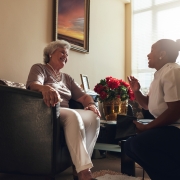According to the World Health Organization, about 2.2 billion individuals have a visual impairment. A significant percentage of this population comprises the older population, ranging from 50 years old and up. Blindness Awareness Month, held every October, highlights the challenges of individuals living with visual impairment. It increases public awareness and shows support and understanding to the entire community, including those in senior housing in Fremont, NE. Join the world as we celebrate Blindness Awareness Month, learn how to maintain optimal eye health, and navigate life with visual impairments.
Blindness Awareness Month
Blindness Awareness Month was first celebrated in October 2009, spearheaded by the Little Rock Foundation from New Jersey. The Little Rock Foundation was founded by the Fiorentino couple Tina and Rocco, inspired by their son Rocco, who was born blind due to premature birth.
Since then, Blindness Awareness Month has become a yearly event for people of all ages and backgrounds. Today, it is about educating the public about the importance of good eye health and the latest treatment innovations. It’s also an event to share incredible and inspiring stories of people with visual impairments. This month advocates for resources and access for visually impaired people to live productive lives and contribute to their communities.
Blindness in Senior Housing Fremont NE
Senior homes are specifically designed for those needing assistance with daily tasks. They are the best options for seniors with visual impairments, ensuring they are well taken care of, especially during emergencies.
Senior housing communities always prioritize accessibility, regardless of their residents’ conditions. This ensures that all residents are safe by making sure hallways and common and recreational areas are well-lit with clear signage to help visually impaired residents. Floor plans are also easy to navigate and free of obstacles. Senior housing Fremont NE has trained and knowledgeable staff members who assist residents in daily living activities such as showering and other personal care needs. Trained staff have a deeper understanding of residents’ needs, allowing them to be more empathetic and create a more welcoming environment.
Assistive devices enhance vision and promote independence in senior housing. Emergency alert systems and personal emergency alert systems make it safer for residents to get around the facility while giving families peace of mind. Senior Housing Fremont NE employs specialized activities and programs to help residents with visual impairment remain physically active. Structured exercise programs, assistive devices, modified sports, and group activities help blind residents maintain their physical health and overall well-being. Look for trained staff, vision-impaired friendly features, and daily support when looking for senior housing Fremont NE.
Click here to learn more about Providence Memory!
Providence Place of Fremont is proud to offer its Assisted Living Services to Fremont NE and its Surrounding areas and Cities: Inglewood, Cedar Bluffs, Ames, Leshara, Arlington, Fontanelle, Nickerson, Telbasta, and North Bend











